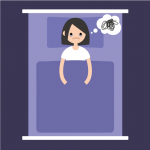Saying that depression is just about feeling sad is just like saying ‘the flu is only about sneezing’. This blog explains why depression is more severe, persistent and pervasive than sadness. Written by PhD student Rosa Cheesman and placement student Tilly Minchin.
Nobody would say that people who have the flu are only sneezing. Most people with the flu sneeze a lot, but their symptoms are never limited to that. Sneezing isn’t as severe as the flu, it lasts a shorter time, and, in isolation, is unlikely to make you take the day off work. Perhaps we could think of sadness and depression as we conceptualise sneezing and the flu…
“Individuals with depression experience a very severe level of sadness.”
Sadness is a core feature of depression. However, a key difference between sadness and depression is a difference of degree. Individuals with depression experience a very severe level of sadness. Depression is also longer lasting than everyday sadness. Sadness is usually a transient emotion, whereas to be classed as depressed, you must have experienced symptoms for at least 2 weeks, and the average depressive episode lasts 6-8 months. Many people suffer from recurrent episodes.
Unlike sadness, depression is also highly impairing and is likely to affect every aspect of a person’s life, including social relationships, work and physical health. What’s more, the effects of depression reach way beyond sadness. Sadness is only one of the symptoms of depression (see the list below). Depression may manifest in some individuals as irritability or anger, and someone’s constellation of symptoms may depend on their age, gender, and other factors.
- A depressed or irritable mood most of the time.
- A loss or decrease of pleasure or interest in most activities, including ones that had been interesting or pleasurable previously.
- Significant changes in weight or appetite.
- Disturbances in falling asleep or sleeping too much.
- Feeling slowed down in your movements or restless most days.
- Feeling tired, sluggish, and having low energy most days.
- Having feelings of worthless or excessive guilt most days.
- Experiencing problems with thinking, focus, concentration, creativity and the ability to make decisions most days.
Finally, the causes are different. Sadness is often a normal and healthy reaction to a negative event. Depression has a complex set of causes, involving genetic and environment risk factors and the interplay between them. Depression may be reinforced by a negative experience of a seemingly neutral event.
“Sadness is just one of many symptoms of depression”
So, the relationship between sadness and depression is somewhat like that between sneezing and the flu. Sadness is just one of many symptoms of depression, and factors including intensity and consistency mean that depression (but not sadness) is considered a mental illness.
This brief blog can’t cover everything about sadness and depression, so here are some other helpful resources:
https://www.nhsinform.scot/illnesses-and-conditions/mental-health/depression



